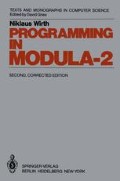Abstract
Modules are the most important feature distinguishing Modula-2 from its ancestor, Pascal. We have already encountered modules, simply because every program is a module. However, most programs are partitioned into several modules, each module containing constants, variables, procedures, and perhaps types. Objects declared in other modules can be referenced in a module M, if they are explicitly made to be known in M, i.e. if they are imported into M. In the examples of the preceding chapters, we have typically imported procedures for input and output from modules containing collections of frequently used procedures. These procedures are actually part of our program, even if we have not programmed them and they are textually disjoint.
Access this chapter
Tax calculation will be finalised at checkout
Purchases are for personal use only
Author information
Authors and Affiliations
Rights and permissions
Copyright information
© 1983 Springer-Verlag Berlin Heidelberg
About this chapter
Cite this chapter
Wirth, N. (1983). Modules. In: Programming in Modula-2. Texts and Monographs in Computer Science. Springer, Berlin, Heidelberg. https://doi.org/10.1007/978-3-642-96757-3_24
Download citation
DOI: https://doi.org/10.1007/978-3-642-96757-3_24
Publisher Name: Springer, Berlin, Heidelberg
Print ISBN: 978-3-642-96759-7
Online ISBN: 978-3-642-96757-3
eBook Packages: Springer Book Archive

